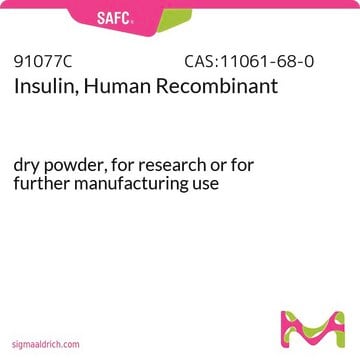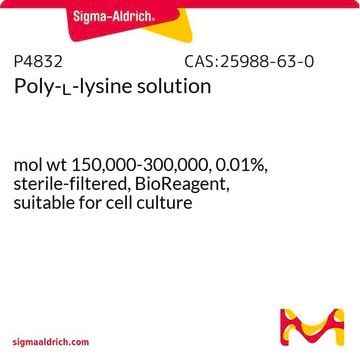SRP0221
PTPIA2 Active human
recombinant, expressed in E. coli, ≥90% (SDS-PAGE)
Sinonimo/i:
ICA512, Islet cell antigen 2, PTPRN, Protein tyrosine phosphatase-like N, R-PTP-N
Autenticatiper visualizzare i prezzi riservati alla tua organizzazione & contrattuali
About This Item
Codice UNSPSC:
12352200
NACRES:
NA.32
Prodotti consigliati
Origine biologica
human
Ricombinante
expressed in E. coli
Saggio
≥90% (SDS-PAGE)
Forma fisica
aqueous solution
PM
58.8 kDa
Confezionamento
pkg of 20 μg
Condizioni di stoccaggio
avoid repeated freeze/thaw cycles
Concentrazione
>0.02 mg/mL
N° accesso NCBI
N° accesso UniProt
Condizioni di spedizione
dry ice
Temperatura di conservazione
−70°C
Informazioni sul gene
human ... PTPRN(5798)
Descrizione generale
PTPRN (protein tyrosine phosphatase, receptor type N), more commonly known as IA-2 (insulinoma-associated protein 2), is a transmembrane protein of the PTP family. It was initially identified as a major autoantigen in type-1 diabetes mellitus. In neuroendocrine cells, it resides in the secretory granules. It is a multi-domain protein with intracellular, transmembrane and extracellular domains, and its intracellular region contains a pseudocatalytic domain. It gets processed multiple times during its life cycle, and its different parts are exposed to different cellular and tissue regions such as nucleus, cytosol, organellar lumen in the secretory pathway, extracellular pancreatic islet space, and membrane compartments. This gene is localized to human chromosome 2q35, and codes for a protein of 979 residues.
Protein tyrosine phosphatase. (PTP-IA2, ICA-512), Catalytic domain, (amino acids 693- 979), (Gene bank accession no. NM_002846), with N-terminal GST tag, MW = 58.8 kDa, expressed in an E. coli expression system.
Applicazioni
Useful for the study of enzyme kinetics, regulation, and to dephosphorylate target substrates.
Azioni biochim/fisiol
PTPRN (protein tyrosine phosphatase, receptor type N) is cleaved at the cytosolic domain during insulin secretion. The cytosolic domain is relocated to nucleus where it promotes insulin gene transcription. This protein plays important role in hormone and neuropeptide secretion. This protein is crucial in controlling the dense core vesicle number in β cells and glucose-induced and basal insulin release. PTPRN null mice show reduced dense core vesicle (DCV) number, abnormal insulin secretion, female infertility, behavioral alteration, and circadian dysregulation.
Definizione di unità
One unit will hydrolyze 1 pmol 6, 8-difluoro-4-methyl umbelliferyl phosphate (DiFMUP) per minute at pH 6.3 and 30°C.
Stato fisico
Formulated in 25 mM Tris-HCl, pH 8.0, 75 mM NaCl, 0.05% Tween-20, 50% glycerol, 2 mM EDTA, 1 mM DTT, and 10 mM glutathione.
Nota sulla preparazione
Thaw on ice. Upon first thaw, briefly spin tube containing enzyme to recover full content of the tube. Aliquot enzyme into single use aliquots. Store remaining undiluted enzyme in aliquots at -70°C. Note: Enzyme is very sensitive to freeze/thaw cycles.
Certificati d'analisi (COA)
Cerca il Certificati d'analisi (COA) digitando il numero di lotto/batch corrispondente. I numeri di lotto o di batch sono stampati sull'etichetta dei prodotti dopo la parola ‘Lotto’ o ‘Batch’.
Possiedi già questo prodotto?
I documenti relativi ai prodotti acquistati recentemente sono disponibili nell’Archivio dei documenti.
Structure of the mature ectodomain of the human receptor-type protein-tyrosine phosphatase IA-2.
Primo ME
The Journal of Biological Chemistry, 283, 4674-4681 (2008)
The dense core transmembrane vesicle protein IA-2 is a regulator of vesicle number and insulin secretion.
Harashima S
Proceedings of the National Academy of Sciences of the USA, 102, 8704-8709 (2005)
Tao Cai et al.
Acta diabetologica, 52(3), 573-580 (2014-12-22)
IA-2 is a transmembrane protein found in the dense-core vesicles (DCV) of neuroendocrine cells and one of the major autoantigens in type 1 diabetes. DCV are involved in the secretion of hormones (e.g., insulin) and neurotransmitters. Stimulation of pancreatic β
María E Primo et al.
PloS one, 6(9), e24191-e24191 (2011-09-22)
ICA512 (or IA-2) is a transmembrane protein-tyrosine phosphatase located in secretory granules of neuroendocrine cells. Initially, it was identified as one of the main antigens of autoimmune diabetes. Later, it was found that during insulin secretion, the cytoplasmic domain of
Il team dei nostri ricercatori vanta grande esperienza in tutte le aree della ricerca quali Life Science, scienza dei materiali, sintesi chimica, cromatografia, discipline analitiche, ecc..
Contatta l'Assistenza Tecnica.








